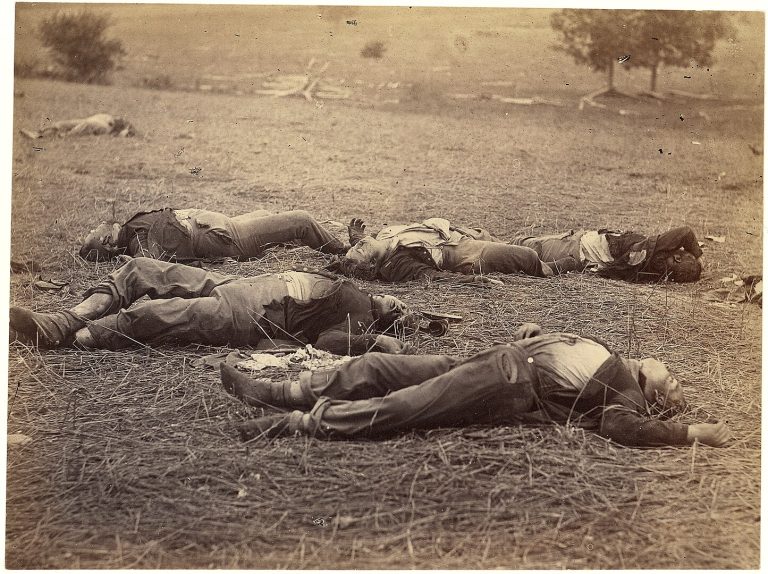
Photo: Dead bodies on the field of Gettysburg, a crucial victory for the Union, July 1863.
War is abhorrent.
There were 360,000 Union and 258,000 Confederate deaths in our Civil War.
Justifying the casualties of the American Civil War through a moral argument involves weighing the profound human cost against the significant and lasting benefits achieved by the war. The following points present a moral framework for this justification:
Abolition of Slavery
- Moral Imperative: The primary moral justification for the Civil War lies in the abolition of slavery. Slavery was a profound moral evil, subjecting millions of African Americans to unimaginable suffering, dehumanization, and brutality. The war ultimately led to the emancipation of these enslaved individuals, fulfilling a moral imperative to end this deeply unjust institution.
- Human Dignity and Rights: By abolishing slavery, the Civil War affirmed the inherent dignity and rights of all individuals, regardless of race. This fundamental shift laid the groundwork for future civil rights advancements and the ongoing struggle for racial equality.

Preservation of the Union
- National Integrity: The war preserved the United States as a unified nation, preventing the fragmentation and potential for increased conflict that could arise from secession. A stable, united country was necessary for ensuring the rule of law, democratic governance, and the protection of individual freedoms.
- Foundation for Progress: The preservation of the Union enabled the United States to grow into a powerful and prosperous nation capable of advancing human rights, democracy, and economic development both domestically and globally.
Long-Term Benefits vs. Immediate Costs
- Enduring Peace and Justice: While the war resulted in significant immediate casualties and suffering, the long-term benefits included a more just and equitable society. The end of slavery and the preservation of the Union set the stage for future progress and prosperity, outweighing the immediate human costs.
- Moral Responsibility: The leaders and participants in the Civil War faced a moral responsibility to confront and resolve the profound injustices and existential threats to the nation. Failing to act against slavery and disunion would have perpetuated systemic injustices and potentially led to greater conflicts and suffering in the future.
Sacrifice and Legacy
- Honoring Sacrifice: The sacrifices made by those who fought and died in the Civil War are honored by the enduring principles of freedom and equality that their actions helped to secure. Their legacy is reflected in the ongoing efforts to realize the full promise of these principles for all citizens.
- Inspiration for Future Generations: The moral courage and determination demonstrated during the Civil War serve as an inspiration for future generations to continue striving for justice, equality, and the protection of human rights, even in the face of significant challenges and sacrifices.
While the casualties of the American Civil War were tragic and immense, they can be morally justified by the significant and lasting achievements of the war: the abolition of slavery, the preservation of the Union, and the promotion of human dignity and rights. These outcomes not only addressed immediate moral imperatives but also paved the way for a more just and equitable society, fulfilling a broader ethical vision for the nation and its future.
Justifying Casualties of American Civil War (June 27, 2023)